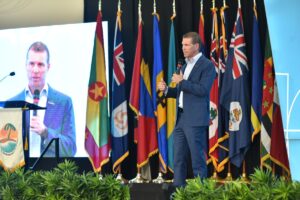May, 2024, St. Georges, Grenada – Prime Minister of Grenada Hon. Dickon Mitchell says stakeholders from a wide cross section of the economy must be included in conversations if the Caribbean is to secure the sustainability of its tourism sector.
Speaking at the 2024 Sustainable Tourism Conference in Grenada on April 22nd, the Prime Minister noted that partnership is important to ensure the industry’s success “if we are talking about sustainable tourism, we need partnership in order to sustain ourselves. So it means that when we have our conversations we need to be a little more inclusive. Invite the farmers, agro processors, fishermen, supply chain people to help us sustain this tourism industry which is our crown jewel in the Caribbean.”
Delivering the key note at the conference, Executive Chairman of Sandals Resorts International Adam Stewart supported the Prime Minister’s call to action, noting that it is only when there is strong partnership among all sectors – private and public – that true sustainability in the regional tourism industry can be achieved.
The conference, which is organized by the Caribbean Tourism Organisation, focused on five key elements for sustainability; People, Planet, Prosperity, Purpose and Partnership. Stewart maintained that it is that last element, “Partnership”, which is key, “perhaps the most powerful part of the five Ps is partnership, public/private partnership. The public sector has a role and the private sector has a role to the degree to which those two things come together determines your gains and your future. So our job, through my eyes in the short time I get to talk is unity, it’s for all of us to come together, to stand together, to take head on the challenges that we face and to find a way to include everybody.’
The Sandals leader noted that regional stakeholders have already demonstrated that it can be done, urging participants at the conference to throw their minds back to the COVID pandemic, when all sectors joined hands making the Caribbean the fastest recovering region for tourism anywhere on the planet, “we pulled together, we unified. We, for the first time in the Caribbean, recognised that we are only as strong as we are together. We worked with the farmers, we worked with the transportation sector, the tour providers, the fishers, the entertainers, even the priests and pastors. I saw the most beautiful harmony take place, I saw cruise ships working with land-based operators in a way that never happened before. The whole supply chain, the linkages came together.”
Stewart maintained that this lesson must never be forgotten, but be the template which drives regional tourism into a bright future, “I believe we must approach all of this with humility, with inclusivity and with open dialogue. We as business leaders and policy makers in government have to dig deeper. We have to stop relying, or pointing to say that’s government business or that’s private sector business. The sooner we come together with the collective to understand that it is our Caribbean business, is the sooner we will get advancement.”
Warning that the traveller today has a wider variety of options fuelled by what they see on social media platforms, Stewart said the region must be more competitive and more ready than ever to attract and welcome visitors, which requires close cooperation between public and private sector, “customers don’t owe us anything. They are explorers. They have the internet and YouTube to guide them without ever leaving the living room. So for us to talk about sustainability we have to do a number of things in harmony. You win when you are frictionless. Tourism, ladies and gentlemen, is the path of least resistance, make it easy for me to get there.”
public and private sector, “customers don’t owe us anything. They are explorers. They have the internet and YouTube to guide them without ever leaving the living room. So for us to talk about sustainability we have to do a number of things in harmony. You win when you are frictionless. Tourism, ladies and gentlemen, is the path of least resistance, make it easy for me to get there.”
Stewart went further to state that islands of the Caribbean should not view each other as competitors but recognise that they are one product, “Antigua is not competing with Saint Lucia, Saint Lucia is not competing with Grenada and Grenada is not competing with Jamaica. The world says Caribbean and they put us together, we are in the pot whether we like it or not. We are competing against France, Italy, Germany, London, Singapore, Dubai …that’s who we are truly competing against. And what we can offer differently I promise you, they can’t do it. Their beaches are not as beautiful, their people are not as warm and friendly in the way our people are, and our stories are more fascinating.”
However, Stewart said the region can only truly realise its potential when stakeholders unite and seek solutions in a non-adversarial, inclusive way with a level of maturity. “To the degree that we can get those things to work together; agriculture, manufacturing, tourism, and all the services working in harmony, the private sector and the public sector, will define our future.”
Captions:
Header: Prime Minister of Grenada Hon. Dickon Mitchell.
Insert: Executive Chairman of Sandals Resorts International Adam Stewart.


 Caribbean News7 days ago
Caribbean News7 days ago
 Caribbean News7 days ago
Caribbean News7 days ago
 Caribbean News1 week ago
Caribbean News1 week ago
 Caribbean News7 days ago
Caribbean News7 days ago
 Bahamas News7 days ago
Bahamas News7 days ago
 News7 days ago
News7 days ago
 Bahamas News1 week ago
Bahamas News1 week ago
 News7 days ago
News7 days ago












